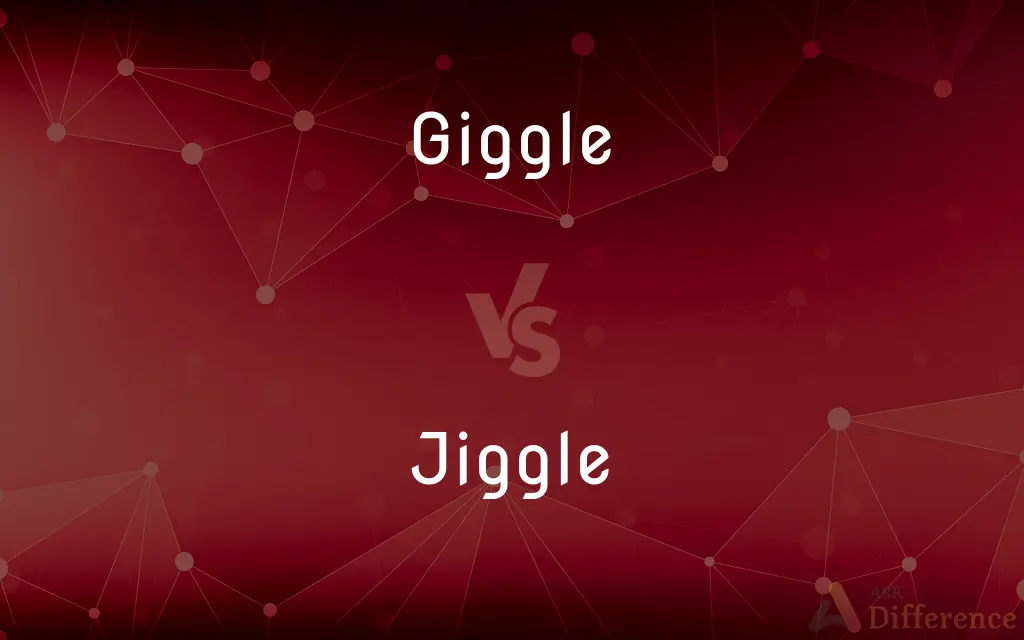Giggle vs. Jiggle — What's the Difference?
By Urooj Arif & Fiza Rafique — Updated on April 27, 2024
Giggle refers to a light, often uncontrollable, laughter, while jiggle involves small, quick movements, typically from being lightly shaken or moved.

Difference Between Giggle and Jiggle
Table of Contents
ADVERTISEMENT
Key Differences
Giggle typically describes a light, spontaneous laugh, often in response to something amusing. Whereas jiggle refers to the act of moving with small, quick motions, suggesting a physical movement.
When someone giggles, it is usually in response to humor or nervousness, creating a sound that is distinctively soft and high-pitched. On the other hand, jiggle describes an object's movement, which can be felt or seen but not heard.
Giggling can be a social response, used to express delight or share a connection with others. In contrast, jiggling is often involuntary, resulting from external forces like vibrations or manual manipulation.
Giggles are often associated with youth and light-heartedness, conveying an innocent quality. Jiggle, however, typically refers to a physical characteristic of objects or body parts, devoid of emotional context.
Giggling can occur in various social situations and is universally recognized as a form of communication. Jiggling is more mechanical and is often used to describe a specific physical reaction, such as a gelatin dessert wobbling or loose items in a bag moving.
ADVERTISEMENT
Comparison Chart
Definition
A light, often uncontrollable laugh.
A series of small, quick movements.
Sound
Characterized by soft, high-pitched laughter.
No inherent sound, but can cause other sounds depending on context.
Context
Social and emotional response to stimuli.
Physical movement, often involuntary or caused by external force.
Connotation
Associated with happiness, light-heartedness.
Often neutral, related to movement characteristics.
Typical Usage
Describes a person's laughter.
Describes the motion of an object or body part.
Compare with Definitions
Giggle
A subdued expression of happiness.
They shared a giggle over the old inside joke.
Jiggle
To move with quick, often small motions.
He jiggled the handle until the door opened.
Giggle
A quick, light laugh.
She couldn't help but giggle at the playful puppy.
Jiggle
A physical reaction to being lightly shaken.
The loose change in his pocket jiggled as he ran.
Giggle
A soft sound of amusement.
His joke caused a giggle to escape her lips.
Jiggle
To cause to move repeatedly and quickly.
She jiggled the baby's toy to catch his attention.
Giggle
An involuntary laugh, often due to nervousness.
Nervous giggles filled the room during the awkward presentation.
Jiggle
A term often used to describe the movement of soft, elastic materials.
The pudding jiggled as she carried the tray.
Giggle
A contagious, cheerful laugh.
Her giggle spread through the group, lightening the mood.
Jiggle
To shake slightly.
The gelatin jiggled on the plate as it was set down.
Giggle
To laugh with repeated short, spasmodic sounds.
Jiggle
To move or rock lightly up and down or to and fro in an unsteady, jerky manner
The gelatin jiggled on the plate.
Giggle
To utter while giggling.
Jiggle
To cause to jiggle.
Giggle
A short, spasmodic laugh.
Jiggle
A jiggling motion.
Giggle
To laugh gently in a playful, nervous, or affected manner.
The jokes had them giggling like little girls all evening.
Jiggle
A relatively weak shaking movement.
Give the key a jiggle and see if it opens.
Giggle
A high-pitched, silly laugh.
Jiggle
(transitive) To shake something gently; to rattle or wiggle.
Jiggle the handle and see if the water stops.
Giggle
(informal) Fun; an amusing episode.
We put itching powder down his shirt for giggles.
The women thought it would be quite a giggle to have a strippergram at the bride's hen party.
Jiggle
(intransitive) To shake, rattle, or wiggle.
The jelly jiggled in the bowl for a few moments after it was set down.
Giggle
To laugh with short catches of the breath or voice; to laugh in a light, affected, or silly manner; to titter with childish levity.
Giggling and laughing with all their mightAt the piteous hap of the fairy wight.
Jiggle
To wriggle or frisk about; to move awkwardly; to shake up and down.
Giggle
A kind of laugh, with short catches of the voice or breath; a light, silly laugh.
Jiggle
A slight irregular shaking motion
Giggle
A foolish or nervous laugh
Jiggle
Move to and fro;
Don't jiggle your finger while the nurse is putting on the bandage!
Giggle
Laugh nervously;
The girls giggled when the rock star came into the classroom
Common Curiosities
How are giggle and jiggle used in social contexts?
Giggle is used in social interactions related to communication and emotional expression, while jiggle is more about describing physical states or actions.
Does the term jiggle have any specific applications in certain fields?
Yes, in physics and engineering, jiggle can describe the movement of mechanical parts or vibrations within structures.
Can both giggle and jiggle be involuntary?
Yes, giggling can be involuntary when laughing uncontrollably, and jiggling can occur involuntarily through external forces.
Is giggling always a positive reaction?
Not necessarily; giggling can also be a nervous or uncomfortable reaction, not just one of amusement.
Can jiggle be controlled or stopped easily?
Depending on the cause, jiggle can sometimes be controlled by stabilizing the object or person that is jiggling.
What typically causes someone to giggle?
Giggling is usually caused by amusement, joy, or nervousness.
What types of objects are described as jiggling?
Objects that are loose or elastic, like gelatin or a bag of coins, are often described as jiggling.
Are there any age-related connotations with the term giggle?
Yes, giggling is often associated with children and youthful behavior, though adults can and do giggle as well.
What emotions are typically associated with hearing someone giggle?
Hearing someone giggle often evokes feelings of warmth, amusement, and companionship.
Does the intensity of jiggle depend on the material’s properties?
Yes, materials that are more elastic and less rigid tend to jiggle more noticeably.
What is the main difference between a giggle and a jiggle?
A giggle is a form of laughter, while a jiggle is a physical movement.
Is there a specific way to stop giggling if it becomes inappropriate?
One common method is to take deep breaths and try to refocus the mind away from the humorous or nervous stimulus causing the giggling.
Can animals jiggle?
Yes, parts of animals' bodies can jiggle, especially if they have loose skin or fat, like the wobble of a dog’s cheeks when it shakes its head.
What health benefits are associated with giggling?
Giggling can reduce stress, strengthen the immune system, and improve overall heart health by increasing oxygen intake and releasing endorphins.
Can the context change the meaning of jiggle?
Yes, in different contexts, jiggle can either be playful or annoying, such as the jiggle of a loose car part versus a jiggling toy.
Share Your Discovery

Previous Comparison
Canine vs. Feline
Next Comparison
Firmament vs. HeavenAuthor Spotlight
Written by
Urooj ArifUrooj is a skilled content writer at Ask Difference, known for her exceptional ability to simplify complex topics into engaging and informative content. With a passion for research and a flair for clear, concise writing, she consistently delivers articles that resonate with our diverse audience.
Co-written by
Fiza RafiqueFiza Rafique is a skilled content writer at AskDifference.com, where she meticulously refines and enhances written pieces. Drawing from her vast editorial expertise, Fiza ensures clarity, accuracy, and precision in every article. Passionate about language, she continually seeks to elevate the quality of content for readers worldwide.














































